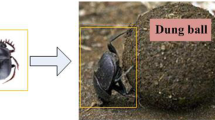Abstract
Due to its robust search mechanism, Gravitational search algorithm (GSA) has achieved a lot of popularity in different research communities. However, stagnation reduces its searchability towards global optima for rigid and complex multi-modal problems. This paper proposes a GSA variant that incorporates chaos-embedded opposition-based learning into the basic GSA for the stagnation-free search. Additionally, a sine-cosine based chaotic gravitational constant is introduced to balance the trade-off between exploration and exploitation capabilities more effectively. The proposed variant is tested over 23 classical benchmark problems, 15 test problems of CEC 2015 test suite, and 15 test problems of CEC 2014 test suite. Different graphical, as well as empirical analyses, reveal the superiority of the proposed algorithm over conventional meta-heuristics and most recent GSA variants.






Similar content being viewed by others
Data Availability
The datasets generated during the current study are available from the corresponding author on reasonable request.
References
Ahandani MA, Alavi-Rad H (2012) Opposition-based learning in the shuffled differential evolution algorithm. Soft Comput 16(8):1303–1337
Bansal JC, Joshi SK, Nagar AK (2018) Fitness varying gravitational constant in gsa. Appl Intell 48(10):3446–3461
Bansal JC, Singh S (2021) A better exploration strategy in grey wolf optimizer. J Ambient Intell Humaniz Comput 12(1):1099–1118
Bhowmik AR, Chakraborty AK (2015) Solution of optimal power flow using non dominated sorting multi objective opposition based gravitational search algorithm. Int J Electr Power Energy Syst 64:1237–1250
Braik M, Sheta A, Al-Hiary H (2021) A novel meta-heuristic search algorithm for solving optimization problems: capuchin search algorithm. Neural Comput Applic 33(7):2515– 2547
Choi TJ, Togelius J, Cheong Y-G (2021) A fast and efficient stochastic opposition-based learning for differential evolution in numerical optimization. Swarm Evol Comput 60:100768
Dinkar SK, Deep K, Mirjalili S, Thapliyal S (2021) Opposition-based laplacian equilibrium optimizer with application in image segmentation using multilevel thresholding. Expert Syst Appl 174:114766
Ewees AA, Elaziz MA, Houssein EH (2018) Improved grasshopper optimization algorithm using opposition-based learning. Expert Syst Appl 112:156–172
Ewees AA, Elaziz MA, Oliva D (2021) A new multi-objective optimization algorithm combined with opposition-based learning. Expert Syst Appl 165:113844
Feng Y, Wang G-G, Dong J, Wang Ling (2018) Opposition-based learning monarch butterfly optimization with gaussian perturbation for large-scale 0-1 knapsack problem. Comput Electr Eng 67:454–468
Gao S, Vairappan C, Wang Y, Cao Q, Tang Z (2014) Gravitational search algorithm combined with chaos for unconstrained numerical optimization. Appl Math Comput 231:48–62
Gupta S, Deep K (2019) A hybrid self-adaptive sine cosine algorithm with opposition based learning. Expert Syst Appl 119:210–230
Gupta S, Deep K, Heidari AA, Moayedi H, Wang M (2020) Opposition-based learning harris hawks optimization with advanced transition rules: principles and analysis. Expert Syst Appl 158:113510
Javad H et al (2021) Feature selection by using chaotic cuckoo optimization algorithm with levy flight, opposition-based learning and disruption operator. Soft Comput 25(4):2911–2933
Hayyolalam V, Kazem AAP (2020) Black widow optimization algorithm: a novel meta-heuristic approach for solving engineering optimization problems. Eng Appl Artif Intell 87:103249
Hooda H, Om PV (2022) Fuzzy clustering using gravitational search algorithm for brain image segmentation. Multimed Tools Appl:1–20
Houssein EH, Neggaz N, Hosney ME, Mohamed WM, Hassaballah M (2021) Enhanced harris hawks optimization with genetic operators for selection chemical descriptors and compounds activities. Neural Comput Applic:1–18
Joshi SK, Bansal JC (2020) Parameter tuning for meta-heuristics. Knowl-Based Syst 189:105094
Joshi SK, Gopal A, Singh S, Nagar AK, Bansal JC (2021) A novel neighborhood archives embedded gravitational constant in gsa. Soft Comput 25(8):6539–6555
Karaboga D, Basturk B (2007) A powerful and efficient algorithm for numerical function optimization: artificial bee colony (abc) algorithm. J Glob Optim 39(3):459–471
Kennedy J, Eberhart R (1995) Particle swarm optimization. In: Proceedings of ICNN’95-international conference on neural networks. IEEE, vol 4, pp 1942–1948
Khan TA, Ling SH (2021) A novel hybrid gravitational search particle swarm optimization algorithm. Eng Appl Artif Intell 102:104263
Li C, Li H, Kou P (2014) Piecewise function based gravitational search algorithm and its application on parameter identification of avr system. Neurocomputing 124:139–148
Li C, Zhou J, Xiao J, Han X (2012) Parameters identification of chaotic system by chaotic gravitational search algorithm. Chaos Solitons & Fractals 45(4):539–547
Liang JJ, Qu BY, Suganthan PN (2013) Problem definitions and evaluation criteria for the cec 2014 special session and competition on single objective real-parameter numerical optimization. Computational Intelligence Laboratory, Zhengzhou University, Zhengzhou China and Technical Report, Nanyang Technological University, Singapore 635:490
JJ Liang, Qu BY, Suganthan PN, Chen Q (2014) Problem definitions and evaluation criteria for the cec 2015 competition on learning-based real-parameter single objective optimization. Technical Report201411A, computational intelligence laboratory, Zhengzhou University, Zhengzhou China and technical report, Nanyang Technological University, Singapore
Long W, Jiao J, Liang X, Cai S, Ming X (2019) A random opposition-based learning grey wolf optimizer, vol 7
Mirjalili S (2016) Sca: a sine cosine algorithm for solving optimization problems. Knowl-based Syst 96:120–133
Mirjalili S, Gandomi AH (2017) Chaotic gravitational constants for the gravitational search algorithm. Appl Soft Comput
Mirjalili S, Gandomi AH, Mirjalili SZ, Saremi S, Faris H, Mirjalili SM (2017) Salp swarm algorithm: a bio-inspired optimizer for engineering design problems. Adv Eng Softw 114:163–191
Mirjalili S, Siti ZMH (2010) A new hybrid psogsa algorithm for function optimization. In: 2010 international conference on computer and information application. IEEE, pp 374–377
Mirjalili S, Lewis A (2014) Adaptive gbest-guided gravitational search algorithm. Neural Computing and Applications 25(7-8):1569–1584
Mittal H, Pal R, Kulhari A, Mukesh S (2016) Chaotic kbest gravitational search algorithm (ckgsa)
Muthusamy H, Ravindran S, Yaacob S, Polat K (2021) An improved elephant herding optimization using sine–cosine mechanism and opposition based learning for global optimization problems. Expert Syst Appl 172:114607
Nasser AB, Zamli KZ, Hujainah F, Ghanem WAHM, Saad A-MHY, Alduais NAM (2021) An adaptive opposition-based learning selection: the case for jaya algorithm. IEEE Access 9:55581–55594
Oliva D, Esquivel-Torres S, Hinojosa S, Pérez-Cisneros M, Osuna-Enciso V, Ortega-Sánchez N, Dhiman G, Heidari AA (2021) An opposition-based moth swarm algorithm for global optimization. Expert Syst Appl:115481
Olivas F, Valdez F, Melin P, Sombra A, Castillo O (2019) Interval type-2 fuzzy logic for dynamic parameter adaptation in a modified gravitational search algorithm. Inf Sci 476:159–175
Pelusi D, Mascella R, Tallini L, Nayak J, Naik B, Deng Y (2020) Improving exploration and exploitation via a hyperbolic gravitational search algorithm. Knowl-Based Syst 193:105404
Poma Y, Melin P, González CI, Martínez GE (2020) Optimization of convolutional neural networks using the fuzzy gravitational search algorithm. J Autom Mob Robot Intell Syst:109–120
Rahnamayan S, Tizhoosh HR, Salama MMA (2007) Quasi-oppositional differential evolution. In: 2007 IEEE Congress on evolutionary computation. IEEE, pp 2229–2236
Rahnamayan S, Tizhoosh HR, Salama MMA (2008) Opposition-based differential evolution. IEEE Trans Evol Comput 12(1):64–79
Rashedi E, Nezamabadi-Pour H, Saryazdi S (2009) Gsa: a gravitational search algorithm. Inf Sci 179(13):2232–2248
Sadollah A, Sayyaadi H, Yadav A (2018) A dynamic metaheuristic optimization model inspired by biological nervous systems: neural network algorithm. Appl Soft Comput 71:747–782
Saeidi-Khabisi F, Rashedi E (Oct 2012) Fuzzy gravitational search algorithm. In: 2012 2nd international econference on computer and knowledge engineering (ICCKE), pp 156–160
Sapre S, Mini S (2019) Opposition-based moth flame optimization with cauchy mutation and evolutionary boundary constraint handling for global optimization. Soft Comput 23(15):6023–6041
Sarkhel R, Chowdhury TM, Das M, Das N, Nasipuri M (2017) A novel harmony search algorithm embedded with metaheuristic opposition based learning. J Intell Fuzzy Syst 32(4):3189–3199
Shan X, Liu K, Sun P-L (2016) Modified bat algorithm based on lévy flight and opposition based learning. Sci Program, 2016
Binod S, Mukherjee V, Ghoshal SP (2012) A novel opposition-based gravitational search algorithm for combined economic and emission dispatch problems of power systems. Int J Electr Power Energy Syst 35(1):21–33
Shaw B, Mukherjee V, Ghoshal SP (2014) Solution of reactive power dispatch of power systems by an opposition-based gravitational search algorithm. Int J Electr Power Energy Syst 55:29–40
Shehadeh HA (2021) A hybrid sperm swarm optimization and gravitational search algorithm (hssogsa) for global optimization. Neural Comput Applic 33(18):11739–11752
Sihwail R, Omar K, Ariffin KAZ, Tubishat M (2020) Improved harris hawks optimization using elite opposition-based learning and novel search mechanism for feature selection. IEEE Access 8:121127–121145
Simon D (2008) Biogeography-based optimization. IEEE Trans Evol Comput 12(6):702–713
Singh T, Saxena N (2021) Chaotic sequence and opposition learning guided approach for data clustering. Pattern Anal Applic:1–15
Sombra A, Valdez F, Melin P, Castillo O (2013) A new gravitational search algorithm using fuzzy logic to parameter adaptation. In: 2013 IEEE congress on evolutionary computation:1068–1074
Song Z, Gao S, Yang Y, Sun J, Todo Y (2017) Multiple chaos embedded gravitational search algorithm. IEICE Trans Inf Syst 100(4):888–900
Storn R, Price K (1997) Differential evolution-a simple and efficient heuristic for global optimization over continuous spaces. J Glob Optim 11(4):341–359
Sun G, Ma P, Ren J, Zhang A, Jia X (2018) A stability constrained adaptive alpha for gravitational search algorithm. Knowl-Based Syst 139:200–213
Tizhoosh HR (2005) Opposition-based learning: a new scheme for machine intelligence. In: International conference on computational intelligence for modelling, control and automation and international conference on intelligent agents, web technologies and internet commerce (CIMCA-IAWTIC’06). IEEE, vol 1, pp 695–701
Tubishat M, Idris N, Shuib L, Abushariah MAM, Mirjalili S (2020) Improved salp swarm algorithm based on opposition based learning and novel local search algorithm for feature selection. Expert Syst Appl 145:113122
Verleysen M, François D (2005) The curse of dimensionality in data mining and time series prediction. In: International work-conference on artificial neural networks. Springer, pp 758–770
Om PV, Aggarwal D, Patodi T (2016) Opposition and dimensional based modified firefly algorithm. Expert Syst Appl 44:168–176
Wang H, Wu Z, Rahnamayan S, Liu Y, Ventresca M (2011) Enhancing particle swarm optimization using generalized opposition-based learning. Inf Sci 181(20):4699–4714
Wang W-C, Xu L, Chau K-W, Zhao Y, Xu D-M (2021) An orthogonal opposition-based-learning yin–yang-pair optimization algorithm for engineering optimization. Engineering with Computers:1–35
Wang Y, Gao S, Yang Y, Wang Z, Cheng J, Yuki T (2020) A gravitational search algorithm with chaotic neural oscillators. IEEE Access 8:25938–25948
Wang Y, Yang Y, Gao S, Pan H, Yang G (2019) A hierarchical gravitational search algorithm with an effective gravitational constant. Swarm Evol Comput 46:118–139
Di W, Wang S, Liu Q, Abualigah L, Jia H (2022) An improved teaching-learning-based optimization algorithm with reinforcement learning strategy for solving optimization problems. Comput Intell Neurosci, 2022
Yang X, Gong W (2021) Opposition-based jaya with population reduction for parameter estimation of photovoltaic solar cells and modules. Appl Soft Comput 104:107218
Zamfirache IA, Precup R-E, Roman R-C, Petriu EM (2022) Reinforcement learning-based control using q-learning and gravitational search algorithm with experimental validation on a nonlinear servo system. Inf Sci 583:99–120
Zhou Y, Hao J-K, Duval B (2017) Opposition-based memetic search for the maximum diversity problem. IEEE Trans Evol Comput 21(5):731–745
Author information
Authors and Affiliations
Corresponding author
Additional information
Publisher’s note
Springer Nature remains neutral with regard to jurisdictional claims in published maps and institutional affiliations.
Rights and permissions
About this article
Cite this article
Joshi, S.K. Chaos embedded opposition based learning for gravitational search algorithm. Appl Intell 53, 5567–5586 (2023). https://doi.org/10.1007/s10489-022-03786-9
Accepted:
Published:
Issue Date:
DOI: https://doi.org/10.1007/s10489-022-03786-9




